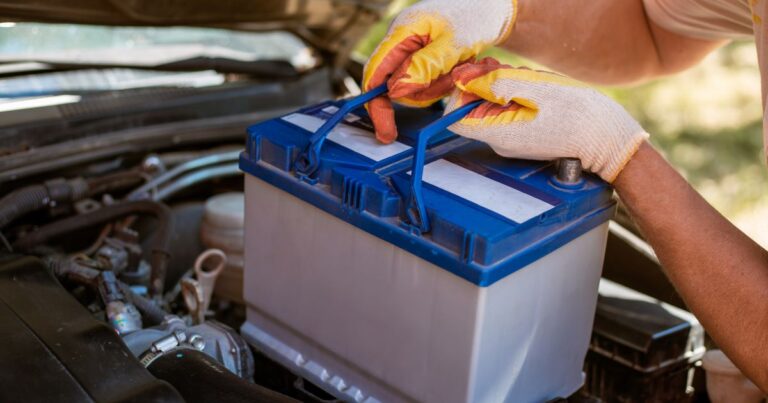Signs of a Failing Car Battery, and Troubleshooting
Car batteries are the heart of your vehicle’s electrical system. They provide the necessary power to start the engine and run various electrical components. However, like all components, car batteries have a lifespan and can fail over time. Recognizing the signs of a failing car battery and understanding battery failure indicators can save you from unexpected breakdowns. In this article, we’ll explore the common symptoms, warning signs, and troubleshooting methods to keep your car running smoothly.
Common Symptoms of a Failing Car Battery
Corrosion on Battery Terminals
Corrosion on battery terminals is a common sign of a failing car battery. This white, ashy substance can impede the flow of electricity, leading to starting issues. Corrosion occurs when battery acid leaks and reacts with the metal terminals. Regularly checking and cleaning the terminals can prevent this problem.
- White or blue powdery substance on terminals
- Difficulty starting the car
- Reduced electrical performance
Slow Engine Crank
A slow engine crank is often the first noticeable symptom of a failing battery. When you turn the key, the engine may take longer to start, or you might hear a sluggish cranking sound. This indicates that the battery is struggling to provide enough power to start the engine.
- Delayed engine start
- Sluggish cranking noise
- Frequent need for jump starts
Dim Headlights and Electrical Issues
Dim headlights and other electrical issues can signal a weak battery. If your headlights appear dimmer than usual or flicker, it might be time to check your battery. Electrical components like power windows and radio may also function erratically.
- Headlights dimming or flickering
- Malfunctioning electrical components
- Inconsistent power supply
Swollen Battery Case
A swollen battery case is a clear indicator of a failing battery. This can happen due to excessive heat or overcharging, causing the battery to expand. A swollen battery is dangerous and should be replaced immediately to avoid leaks or explosions.
- Bulging or swollen battery case
- Visible deformation of the battery
- Risk of leaks or explosions
Battery Warning Signs You Shouldn’t Ignore
Check Engine Light Illumination
The check engine light can illuminate for various reasons, including battery issues. If this light comes on, it’s essential to investigate further. A failing battery can trigger this warning, indicating that the electrical system is compromised.
- Check engine light on dashboard
- Possible battery or alternator issue
- Requires immediate attention
Clicking Sound When Starting
A clicking sound when starting your car is a classic sign of a failing battery. This noise occurs when the battery doesn’t have enough power to engage the starter motor. If you hear this sound, it’s time to test your battery.
- Clicking noise during ignition
- Insufficient power to start the engine
- Potential starter motor issues
Frequent Jump Starts Required
If you find yourself frequently needing jump starts, your battery is likely on its last legs. While jump-starting can temporarily solve the problem, it’s not a long-term solution. A battery that can’t hold a charge needs replacement.
- Regular need for jump starts
- Battery unable to hold a charge
- Indicates severe battery degradation
Rotten Egg Smell Under the Hood
A rotten egg smell under the hood is a sign of a leaking battery. This odor is caused by sulfuric acid leaking from the battery, which can damage other engine components. If you notice this smell, inspect your battery immediately.
- Unpleasant sulfuric odor
- Potential battery acid leak
- Risk of damage to engine components
How to Diagnose Battery Problems
Perform a Visual Inspection
A visual inspection can reveal a lot about your battery’s condition. Look for signs of corrosion, leaks, or physical damage. Ensure that the battery is securely mounted and that the terminals are clean and tight.
- Check for corrosion and leaks
- Inspect for physical damage
- Ensure secure mounting
Test Battery Voltage
Testing the battery voltage is a straightforward way to assess its health. A fully charged battery should read around 12.6 volts. Anything below 12.2 volts indicates a weak or failing battery.
- Use a multimeter to test voltage
- Fully charged battery: 12.6 volts
- Weak battery: below 12.2 volts
Load Test the Battery
A load test can determine if your battery can hold a charge under load. This test simulates the conditions of starting the car and can identify weak batteries that may not show symptoms under normal conditions.
- Simulates starting conditions
- Identifies weak batteries
- Requires specialized equipment
Check Alternator Output
The alternator charges the battery while the engine runs. If the alternator isn’t working correctly, the battery won’t charge properly. Check the alternator output to ensure it’s providing the correct voltage.
- Measure alternator output
- Ensure proper charging voltage
- Diagnose alternator issues
Factors That Affect Battery Life
Age of the Battery
The age of the battery is a significant factor in its performance. Most car batteries last between 3 to 5 years. As the battery ages, its ability to hold a charge diminishes, leading to potential failure.
- Typical lifespan: 3-5 years
- Reduced performance with age
- Consider replacement after 3 years
Extreme Temperatures
Extreme temperatures can significantly impact battery life. High heat can cause the battery fluid to evaporate, while cold temperatures can reduce the battery’s ability to start the engine.
- Heat causes fluid evaporation
- Cold reduces starting power
- Protect battery from temperature extremes
Short Trips and Infrequent Use
Short trips and infrequent use can prevent the battery from fully charging. If the car isn’t driven regularly, the battery may not receive enough charge, leading to a shorter lifespan.
- Short trips prevent full charge
- Infrequent use leads to discharge
- Consider a battery maintainer
Electrical System Issues
Issues within the electrical system can drain the battery. Faulty wiring, parasitic drains, or malfunctioning components can cause the battery to discharge even when the car is off.
- Check for parasitic drains
- Inspect wiring and components
- Address electrical issues promptly
Preventive Maintenance for Car Batteries
Regular Battery Checks
Regular battery checks can help identify potential issues before they become serious. Inspect the battery for signs of wear and test its voltage periodically to ensure it’s in good condition.
- Inspect for wear and damage
- Test voltage regularly
- Identify issues early
Proper Cleaning and Connection
Keeping the battery clean and ensuring proper connections can prevent many common issues. Clean the terminals and ensure they are tightly connected to avoid power loss.
- Clean terminals regularly
- Ensure tight connections
- Prevent power loss
Avoiding Deep Discharges
Deep discharges can significantly reduce battery life. Avoid leaving lights or accessories on when the engine is off, and ensure the battery is charged regularly.
- Avoid leaving lights on
- Charge battery regularly
- Prevent deep discharges
Using a Battery Maintainer
A battery maintainer can keep your battery charged when the car isn’t in use. This device is especially useful for vehicles that are stored for long periods. Battery charger selection Choose a charger that matches your battery type and size to keep your devices powered up safely and efficiently Durable camper cells are special batteries that last a long time and can power things in camping trailers They help campers use electricity for lights and appliances when they are far from regular power sources
BMS enhances longevity by helping our bodies work better and stay healthy for longer This system supports our cells and organs to function well as we age Automotive power restoration challenges When a car’s battery dies or electrical system fails it can be tricky to get the power working again Mechanics need special tools and knowledge to fix these problems and get vehicles running
Battery selection guide Choose the right battery for your device by looking at size voltage and how long it lasts
- Keeps battery charged during storage
- Ideal for infrequent use
- Extends battery life
When to Replace Your Car Battery
Age-Based Replacement
Replacing your battery based on age is a proactive approach to avoid unexpected failures. If your battery is over three years old, consider replacing it to ensure reliability.
- Replace after 3-5 years
- Proactive approach
- Avoid unexpected failures
Performance-Based Replacement
If your battery shows signs of decreased performance, such as slow cranking or frequent jump starts, it’s time for a replacement. Performance-based replacement ensures your car starts reliably.
- Replace if performance decreases
- Ensure reliable starting
- Avoid frequent jump starts
After Jump Starting Multiple Times
If you’ve had to jump-start your car multiple times, it’s a clear sign that the battery is failing. Replacing the battery will prevent further inconvenience and potential damage to the electrical system.
- Multiple jump starts indicate failure
- Prevent inconvenience
- Protect electrical system
FAQ’s
How do I know if my car battery is dying?
Signs of a failing car battery include slow engine crank, dim headlights, electrical issues, and corrosion on battery terminals. These symptoms indicate that the battery is struggling to provide adequate power. Regular checks can help identify these issues early.
What are the signs of a bad alternator vs. bad battery?
While both can cause similar symptoms, a bad alternator typically results in a battery that won’t hold a charge, while a bad battery often shows signs of age and decreased performance. Testing both components can help determine the root cause of the problem.
Can a car battery go dead suddenly?
Yes, a car battery can fail suddenly due to factors like extreme temperatures, internal short circuits, or leaving lights on overnight. Regular maintenance and checks can help prevent sudden failures.
How long do car batteries usually last?
According to a study by Battery Council International, the average car battery lasts 3-5 years, depending on usage and maintenance. Regular checks and proper care can extend the battery’s lifespan.
What voltage is too low for a car battery?
A fully charged car battery should measure around 12.6 volts. Anything below 12.2 volts indicates a weak or failing battery. Regular voltage checks can help ensure your battery remains in good condition.
By understanding these signs and taking preventive measures, you can ensure your car battery remains in optimal condition, reducing the risk of unexpected breakdowns. Regular maintenance and timely replacements are key to a reliable vehicle.






